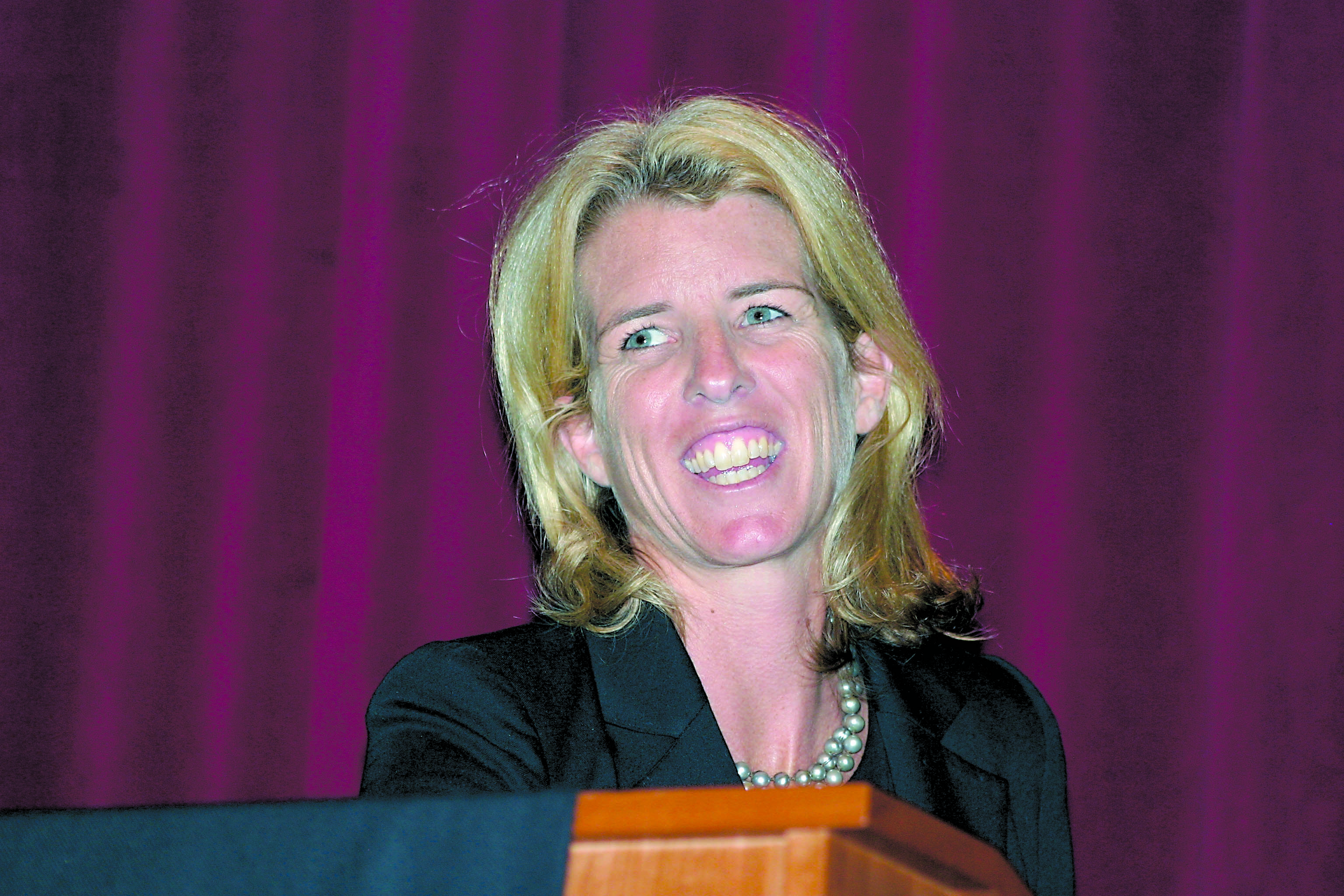PORT ANGELES — Rory Kennedy, the youngest child of Robert F. and Ethel Kennedy, packed the Peninsula College Little Theater twice this past week.
She charmed her crowds, drawing a standing ovation for wide-ranging speeches about her career as a documentary filmmaker and her life as a member of the Kennedy clan.
The founder of Moxie Firecracker Films, Kennedy makes documentaries that are hard to watch.
She acknowledged that while showing clips from her movies.
They’re gritty stories, far from the usual cinematic fare, as they look inside family homes from Appalachia to Thailand.
Kennedy’s first talk was to a standing-room-only crowd in the college’s 260-seat theater in a free Studium Generale presentation at 12:30 p.m. Thursday.
That night, the theater was nearly full again, with an attendance of 190 at the $95-a-plate “American Conversations” dinner to benefit the Peninsula College Foundation scholarship fund.
Both audiences saw a variety of film clips from Kennedy’s unflinching documentaries, including “Pandemic: Facing AIDS,” an Emmy-nominated series that aired on HBO in 2003.
AIDS in Asia
In it, Kennedy took viewers on a trip across Southeast Asia with an ex-prostitute who, dying of AIDS, goes home to say goodbye to her parents.
The Thai woman’s mother embraces her, weeping.
But her father stands apart, personifying the stigma surrounding his daughter’s illness.
That stigma is more excruciating to AIDS patients, Kennedy said, than any physical pain.
Yet the “Facing AIDS” documentary’s ending sees the family reunited once again.
Months after their daughter’s visit, the parents traveled across the country to be with her at an AIDS hospice shelter.
She and her father reconciled. She died in his arms.
Appalachian family
Kennedy showed another film about family bonds: “American Hollow,” about a young woman in rural Appalachia.
At first, she is enmeshed in a violent relationship.
Then, determined to protect her children, the woman finds her way to a women’s resource center.
There, she gains the tools to leave her abuser.
Her family also comes to her aid, and she starts a new life.
Social programs such as the women’s shelter, coupled with family members, Kennedy said, “can make all the difference in the world.”
Displaying heroism
Kennedy, 43, is a filmmaker seeking to show the experiences — and to her mind, the heroism — of people who would otherwise be unknown to mainstream urban America.
They are a long way from her life experience, she acknowledged:
“I have learned so much from making these documentaries.
“Time and time again, I have seen people overcome obstacles that are just unimaginable to me.”
Born six months after her father’s assassination in 1968, Kennedy was brought up — with her 10 siblings — by their mother, Ethel.
She never thought her mother would agree to a documentary about her extraordinary life as a political wife, widow and matriarch.
But when Rory asked, Ethel said yes.
“Why?” was the daughter’s next question.
“Because you asked me. I would do anything for you,” Ethel replied.
Ethel Kennedy
The documentary “Ethel” will have its television premiere on HBO a week from this Thursday, Oct. 18.
Ethel, now 84, is a fighter for social justice in her own right, her daugher emphasized.
She brought her children with her when she traveled to South Africa to speak out against apartheid — and when the kids wanted to join an anti-apartheid protest at home and get arrested in the process, Ethel jumped up and gave them a ride to it.
“She has no hesitancy to say what she thinks is right when she sees something that is wrong,” Kennedy said.
Ethel believes a life of service is a gift, not an obligation, her daughter added.
Kennedy’s next project following “Ethel” is a documentary about American military service members.
It’s to be a PBS “American Experience” program about how U.S. soldiers, leaving Saigon as it was falling to North Vietnamese rule in 1975, helped evacuate some 40,000 South Vietnamese refugees.
Jim Whittaker
Just before finishing her speech, Kennedy hailed a member of her audience who knew her father well: Jim Whittaker of Port Townsend.
Whittaker, who is primarily known for summiting Mount Everest in 1963, climbed another peak with Robert F. Kennedy two years later: Canada’s 14,000-foot Mount Kennedy, which had just been named in honor of the slain President John F. Kennedy.
As the family story goes, Bobby Kennedy prepared for the ascent in an unconventional fashion.
He spent the preceding weeks “running up and down the stairs at Hickory Hill [the family home] yelling, ‘Help!,’” Rory told the crowd, flashing a smile as big as her father’s.
Bobby made it to the top.
On the summit he left a copy of JFK’s inaugural address, the document in which the 43-year-old president delivered his message about service:
“Ask not what your country can do for you,” the new leader said. “Ask what you can do for your country.”
________
Features Editor Diane Urbani de la Paz can be reached at 360-452-2345, ext. 5062, or at diane.urbani@peninsuladailynews.com.

